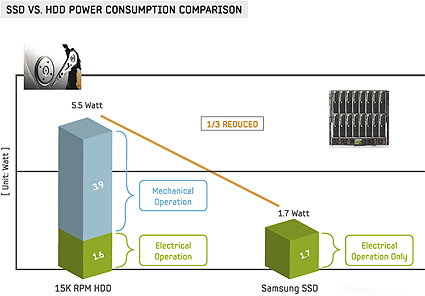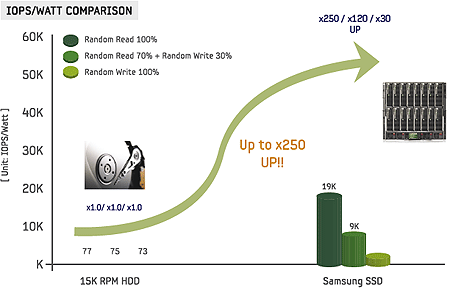SSD 102: The Ins And Outs Of Solid State Storage
The benefits introduced by solid state drives are undeniable. However, there are a few pitfalls to consider when switching to this latest storage technology. This article provides a rundown for beginners and decision makers.
Outlook
Outlook
We deliberately didn’t dig into specific SSD products at this point, as we have other articles dealing with them. Instead, we focused on a higher level overview, basic functions and features, performance and power consumption, business relevance, and some recommendations that should help you find the right course for stepping into the SSD world.
The market is flooded with client SSD products for PCs and laptops. Many of them provide decent performance, and if you have a solid Windows 7-based system and are willing for fork out at least $300, then there's little reason not to purchase an SSD to replace your hard drive. You’ll notice the difference immediately.
Such a step has to be planned more thoroughly for business, and SSDs might not necessarily be the best choice in such environments. Watch the minimum performance results in reviews so you can be sure your systems maintain required performance levels. Check pitfalls with RAID support, AHCI, and TRIM, and ensure that you’ll have support from your favorite vendor. Confirm that your systems are powerful enough to take maximum advantage of the intended SSD storage solution; otherwise you’ll run into self-made bottlenecks.
Once all hurdles are overcome, you can examine key metrics, such as I/Os per dollar, I/Os per watt, and finally some ownership cost considerations. From this point of view, you'll quickly realize that there is no other reasonable option but to deploy SSDs into I/O-intensive environments. The hard part is finding the right way to introduce SSDs into your business in compliance with requirements, regulations, and system validation. Technologically, SSDs are ready.
Get Tom's Hardware's best news and in-depth reviews, straight to your inbox.

Patrick Schmid was the editor-in-chief for Tom's Hardware from 2005 to 2006. He wrote numerous articles on a wide range of hardware topics, including storage, CPUs, and system builds.
-
Lewis57 A very good article. I love these articles explaining everything. I'm planning on buying two OCZ Vertex 2E 60GB for RAID-0 when I get enough money. Can't wait, should be one hell of an upgrade from a single 5400rpm WD green drive.Reply -
ares1214 Memristors might make SSD's sorter lived than people thought, but who knows. Great article btw.Reply -
JoeSchmuck From what I understand, TRIM is supported under IDE mode using Win7 as well so you do not need AHCI. I have a Samsung’s VBM19C1Q firmware device and running IDE mode.Reply -
Earlier this year we deployed a 5 node failover cluster with iSCSI backend. Each of the VM Host servers utilize a pair of solid state drives for booting and operating, with VM's running off of iSCSI shared cluster volumes. The servers are unbelievably fast and stable - 6 months of 100% uptime on Windows 2008R2. We only use magnetic HDD's now for transporting backups off site.Reply
-
One thing that I'm very curious, if we follow Tomshardware's advice to turn off disk defragmentation, the files on SSD would be defragmented over time.Reply
Upon SSD data loss, can we recover the data files if it's defragmented, especially on a SSD that has never been defragmented as Tomshardware had recommended? -
randomizer Defragmentation of an SSD is not entirely unnecessary. It's important to distinguish between file fragmentation and free space fragmentation. The former is not an issue with SSDs because all parts of an SSD can be read at the same rate (the same is true for writing if the blocks are clean). But fragmentation of free space, whereby free space is largely distributed across partially-filled blocks, can severely reduce the performance of an SSD. Any time a file of <512kB is written to an SSD, it will take up only part of a block. However, the SSD will eventually run out of clean blocks and will need to re-arrange the data by erasing partially-filled blocks and consolidating them to free up more blocks for further writing. Running a free space defragmentation on the drive will aggressively consolidate the data on-demand so that you don't have the problem occurring when you didn't plan for it.Reply
Most SSDs will perform this process themselves when idle for extended periods, but it happens at a slow rate. This is what most manufacturers refer to when they talk about Garbage Collection. -
Alvin Smith Please send me the four fastest 256GB SSDs on the market, so that I might perform my own comparison ... I'll just sit by the door and wait for UPS to arrive.Reply
Thanks, in advance !!
= Alvin =
-
gordonaus I put an SSD in my new computer and it was good but after i got the firmware update and changed to AHCI it was AMAZING (OZC Vertex 2 60gb). I would say tho that 60 gb is not enough, i installed windows photoshop and a few other design programs and i only have 20GB leftReply

